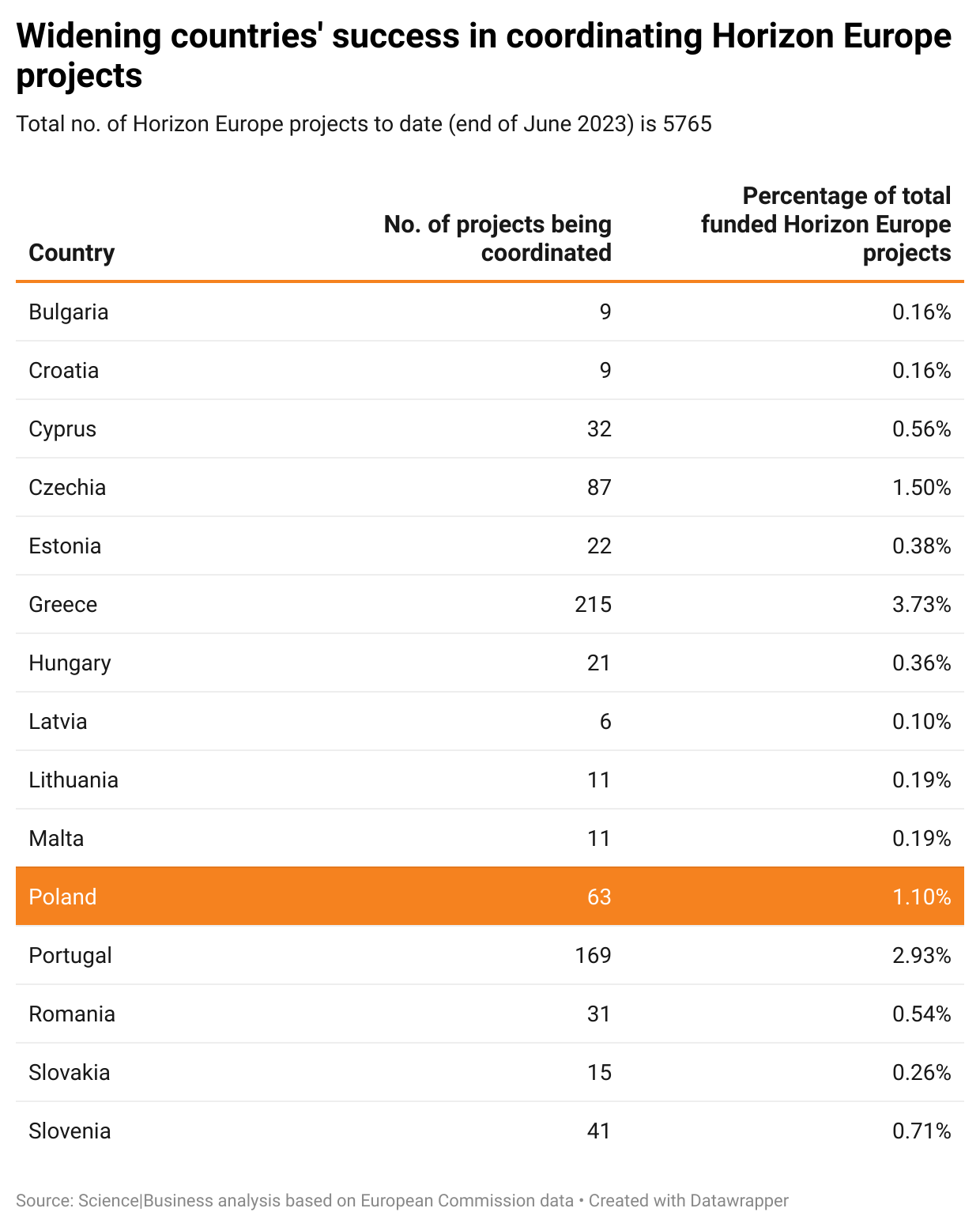In a sign of increased self-confidence, three projects led from Poland have won EU funding. This is seen as a significant advance for a country whose researchers have preferred to join consortia as partners, not leaders

A researcher from Kozminski University will head up a new €3 million Horizon Europe project, the first time the university has been a coordinator of a project and not just a partner. Photo: Kozminski University / Flickr
A Polish researcher who is to lead a €3 million Horizon Europe project in the field of social sciences - a major success given how rare this is for the country - says she hopes it will inspire others to follow in her tracks.
This is the first time since Horizon Europe started in 2021 that a project in this domain coordinated by a Polish institution has been selected for funding. And although details are yet to be disclosed, another two projects selected for funding in the latest round will be coordinated by institutions in Poland, marking a breakthrough for the country.
Izabela Grabowska, professor of social sciences at Kozminski University, says she is all too aware it is unusual for a woman at a Polish institution to be taking a lead on a large EU research project. “Polish scholars and institutions are more eager to join consortia as partners, not as leaders,” she said. “I hope this project will inspire more to apply as coordinators.”
Her Links4Skills project focuses on the flow of talent and skills between third countries and the EU, a topic of vital importance to policymakers, especially with the war in Ukraine and the displacement of people this has caused. The project involves 13 universities and institutions from around the world, including the Catholic University of Ukraine, as well as partnerships with two companies to help with the IT aspects.
Like the two other selected proposals with Polish coordinators, Links4Skills was submitted under cluster two of Horizon Europe, which is dedicated to funding research in culture, creativity and inclusive society.
Mikołaj Pyczak, Polish national contact point (NCP) and programme committee expert for cluster 2 of Horizon Europe, said this is a field in which the country has typically not had much luck.
“I’m really happy about [the results of the latest call] because we have been working together with our different institutions which have been submitting coordination proposals and they have had mixed results, getting close or getting on the reserve list,” he said. “Now, boom, three coordinations in one call on the rank list to be funded. We’ll try to build on this success.”
In the seven years of the previous framework programme Horizon 2020, only two social science-related projects were coordinated by Polish institutions.
Across all research disciplines, it is far from common for Poland and countries in central and eastern Europe to coordinate projects funded by Horizon Europe.
Under Horizon Europe, Polish institutions are lead coordinator on 63 of 5,765 funded projects, EU figures up to the end of June show. This equates to just over 1% of all projects, an improvement on Horizon 2020 when Polish institutions led the coordination on 0.9% of all projects.
That makes Poland the fourth most successful country in coordinating projects among the 15 Widening countries that have lower research and innovation performance scores.
If front runners Greece and Portugal are removed from the list, in total institutions from the remaining 13 Widening countries are only coordinating 6.2% of all Horizon Europe projects.

Past challenges and hope for future success
Two big obstacles have stood in the way of Polish institutions and researchers leading Horizon Europe projects, Pyczak said. One is a lack of individual and institutional networking - meaning Polish researchers have not had the connections and experience of building international consortia; the other is a shortage of support services from their institutions to help with aspects like administration or financing.
For Pyczak, the results of the latest call show that these two issues have been recognised and are being dealt with.
“Matchmaking and brokerage events and proposal assessment services organised by the NCP network have really helped,” he said. “This all helps to build networks and once you are recognised for one project, it is easier to get onto the next one.”
Many larger and even some smaller institutions in Poland have also started to build stronger research support services. “This was quite a challenge but it has been well addressed,” Pyczak said.
For Grabowska, her own involvement in international consortia and working with partners around the world was instrumental in formulating a successful proposal. She participated in a Horizon 2020 project and has built an extensive international network of contacts in her field, something that many other Polish researchers have yet to do.
In addition, she had good support from Kozminski University. “It takes a lot of time to put together a proposal as a coordinator, some extra financial support and also flexibility from the institution, such as allowing professors to move schedules around,” she said. “Not all universities are willing to do this, and for many colleagues in public universities, this serves as a disincentive to apply as a coordinator. Sometimes it’s just too much work.”
But progress is being made, and in the almost 20 years Poland has been a member of the EU, expertise has been growing step by step. “The years to come will be even better,” Grabowska said, caveating it by adding “if we are not limited by populist governments.”
What has helped is grant schemes such as those run by the Polish National Science Centre (NCN), which are modelled after European Research Council grants that support basic research. This gives Polish researchers an opportunity to build funding experience similar to what is required on a European level, but in a less competitive playing field.
Equally important has been Polish researchers’ involvement in the CHANSE (Collaboration of Humanities and Social Sciences in Europe) competition, coordinated by the NCN. This brings together 27 research funding agencies from 24 European countries, and in 2022 scientists from Poland participated in 12 out of 26 selected projects.
“People just need to keep learning, keep doing, keep failing and eventually keep winning,” Grabowska said. “Like everything, you need to learn, and failing is an important part of that.”
Pyczak is also excited about the potential for future Polish success in leading social sciences projects. “Once we start showcasing the successes we’ve had, I hope more people feel encouraged and use the tools available and try again to apply with their ideas and solutions for the next Horizon Europe calls,” he said.





 A unique international forum for public research organisations and companies to connect their external engagement with strategic interests around their R&D system.
A unique international forum for public research organisations and companies to connect their external engagement with strategic interests around their R&D system.